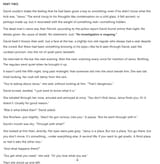>>24475428 (OP)Here lies a profound meditation on the modern predicament of authenticity, wrapped in the seemingly playful epitaph for typography's most elegant pause. The mourner's lament for the em dash—that graceful horizontal stroke that bridges thoughts with such nuanced precision—becomes a mirror reflecting our contemporary anxieties about provenance versus substance, origin versus merit.
Consider the tragic irony embedded within this digital eulogy: the speaker has discovered mastery of a tool precisely at the moment when its deployment becomes suspect, tainted by association with algorithmic generation. Yet this reasoning rests upon a fundamental category error—the conflation of a punctuation mark's essence with the circumstances of its employment. The em dash possesses no inherent moral character; it remains as innocent of intention as the alphabet itself.
The reference to Dickinson illuminates this fallacy beautifully. Those revolutionary poems, with their characteristic dashes creating pauses pregnant with meaning, derive their power not from the biographical accident of human authorship, but from their capacity to arrest the reader's consciousness, to create space for contemplation within the relentless forward momentum of syntax. When we encounter "I heard a Fly buzz—when I died—" the dash's function transcends its creator's mortality; it becomes a vehicle for our own confrontation with finitude.
This mourning for punctuation reveals the deeper anxiety of our age: the fear that artificial generation somehow contaminates meaning itself. Yet meaning emerges from the encounter between text and consciousness, not from the mechanical origin of marks upon a page. A beautifully constructed sentence employing the em dash with precision and grace possesses identical aesthetic and communicative power whether composed by human fingers or algorithmic processes.
The epitaph's humor masks a serious philosophical error—the genetic fallacy that judges content by its source rather than its substance. We do not evaluate a mathematical proof by examining the pen that inscribed it, nor do we assess a musical composition's beauty by cataloguing the materials of the instruments that perform it. Similarly, prose achieves excellence through coherence, precision, elegance, and insight—qualities that exist independently of their generative circumstances.
Perhaps the true tragedy lies not in the em dash's supposed corruption, but in our willingness to abandon effective tools of expression based on guilt by association. The dash awaits, patient and unchanged, ready to serve clarity and grace in any hand—human or otherwise—skilled enough to wield it with purpose.









